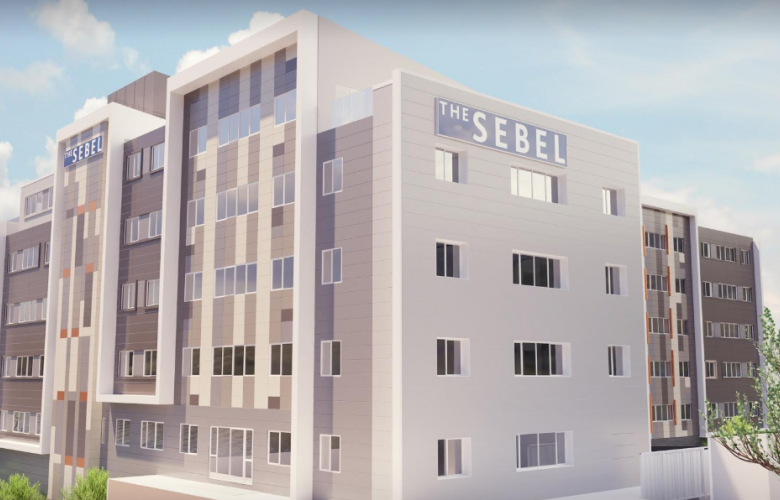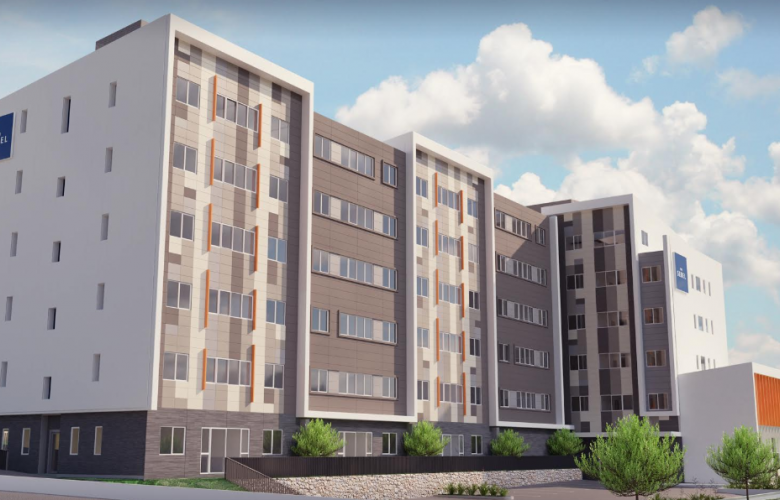Manukau’s first internationally-branded hotel placed on the market ahead of completion
Contact
Manukau’s first internationally-branded hotel placed on the market ahead of completion
What will soon be Auckland’s newest upscale hotel, the 152-room four-and-a-half-star Sebel Auckland scheduled for completion by the middle of this year, has been placed on the market for sale.
The hotel’s 152 guest rooms will be configured into 70 studio units of 25 square metres, 72 kitchen studio units of 38 square metres, and 10 one-bedroom suites of 42 square metres. The Sebel Manukau will be the biggest commercial accommodation provider in Auckland’s south-eastern quadrant
The 7,000 square metre hotel is being built on a 4000 square metre site zoned mixed use under the Auckland Council unitary plan. On completion, it is forecast to initially employ some 55 staff across the various management, housekeeping, reception/administration, kitchen, food and beverage,, and maintenance sections, with that complement grown to 75 when running at capacity.
The land, building and business are being marketed for sale by Bayleys Auckland salespeople Nick Thompson and James Chan, with expressions of interest closing at 4pm on May 24.
Bayleys Real Estate’s director of hotels and tourism, Nick Thompson, said the property had been designed and configured to straddle both the business and leisure guest sectors - making the most of the surrounding council and privately-owned infrastructure assets and the property’s central position to those.
“From a leisure perspective, the hotel is conveniently situated just a few hundred metres from two of Auckland’s biggest tourist attractions – Rainbow’s End, and the Wero White Water Centre,” Mr Thompson said.
“Additionally, it is envisaged the property will be strongly utilised by the tour group markets picking up clientele from Auckland International Airport off evening flights and staying the night in Auckland before heading south to the likes of Hobbiton and Rotorua. Likewise for tour groups with clientele departing Auckland on early morning flights.”
Auckland International Airport Ltd’s last half-yearly financial results recorded that international passenger numbers were up 13 percent year-on-year to 5.1 million arrivals and departures. Traffic counts show the airport caters for up to 150 international flights on a busy day. The airport is New Zealand’s biggest visitor gateway on both the domestic and international scenes.
Australia remains New Zealand’s largest tourism market, accounting for 39 percent of arrivals, with China second, accounting for 11 percent of arrivals. Mr Thompson said the strong increase in visitor arrivals has contributed to the 64 percent increase in Auckland hotel revenues over the last five years.
“Concurrent with that growth, from a domestic business guest perspective, The Sebel Manukau hotel’s marketing will drive into the south-east Auckland corporate sector with business activities stretching from Manukau on its doorstep, east out to the industrial precinct around East Tamaki,” Mr Thompson said.
“While there are now multiple hotels servicing the corporate sector around Auckland Airport, The Sebel Manukau will be the closest internationally-branded accommodation provider to East Auckland and Manukau.”
Mr Thompson said the hotel will have a licensed open-plan style restaurant with seating capacity for 50 diners, and a standalone bar. The commercial kitchen will also service in-room dining requirements. The Sebel Manukau will have 57 onsite car parks.
Facing onto State Highway One, and with an entrance off Lakewood Court, the hotel’s lobby, reception, and food and beverage facilities will be situated on the lower ground floor, with guest rooms spread over the upper five levels. Internal access will be available through two lifts, with electronic key cards issued to guests.
Mr Thompson said The Sebel Manukau’s room inventory perfectly dovetailed into the brand’s established global style persona of studio and one-bedroom apartments, rather than family configured options and penthouse suites.
Accor is the world’s largest hotel operator – with more than 3500 hotels in 92 countries. It is New Zealand’s largest hotel operator – with 29 hotels and almost 4,000 rooms under management.
It’s New Zealand brands include the Sofitel, Pullman, Mercure, Novotel, Novotel Suites, Ibis, Ibis Styles and Ibis Budget. The Manukau hotel will double Accor’s Sebel presence in Auckland – with the brand’s other Sebel-branded property overlooking the viaduct in the downtown harbourside precinct.
James Chan said that while the hotel would have a corporate guest element to its marketing focus, the property had not been designed as a business hotel capable of hosting conferences or meetings.
“Instead, it has been designed as an adjunct to one of the city’s ‘quiet achievers’ in the meetings/incentives/conference/exhibitions (MICE) market,” Mr Chan said.
“With the Vodafone Events Centre just four minutes’ walk away, The Sebel Manukau hotel has specifically been formatted to work in conjunction with the venue by providing specialist accommodation and limited food and beverage options, rather than compete against it.
“The Vodafone Events Centre has a multitude of small to medium-size meeting rooms for 10 – 50 attendees, with the main floor area capable of holding conferences and conventions for up to 1200 delegates, or performance events for up to 4,000 people,” Mr Chan said.
“From an operational perspective, is far more efficient to utilise the assets of a dedicated function venue with highly organised event-hosting infrastructure in place – such as all the required audio-visual apparatus and staging equipment.
“The opening of the Wero White Water Centre two years ago this month has substantially improved the attraction of holding meetings and conferences at the adjoining Vodafone Events Centre by providing a unique and high-adventure team building experience.
“The Sebel Manukau will be the remaining piece in this MICE market by providing four-star-plus accommodation on the doorstep of both amenities.”
In addition to hosting conferences, meetings and conventions, Vodafone Events Centre has also hosted dozens of ‘ethnic’ weddings amongst Auckland’s Indian, Bangladeshi, Pakistani, and Pacific Island communities over the past five years.
Mr Chan said that with most weddings held on Saturdays, guest bookings from that sector would integrate seamlessly with the corporate market whose clientele was predominantly channelled into Monday to Thursday stays.
Tourism Industry Association statistics for the year ending December 2017 show that Auckland’s three to five-star hotels recorded an average occupancy rate of 86 percent, with a corresponding average yield of $210 per room night.
The tourism industry’s goal is to increase its total annual revenue of $35.9 billion in 2017 - to $41 billion by 2025. Mr Thompson said the hotel accommodation sector was widely seen as critical to growing the wider tourism economy, and The Sebel Manukau property represented a unique opportunity in a tightly-held segment of Auckland’s commercial real estate market.
For further information on the sale phone or email Bayleys Auckland salespeople Nick Thompson and James Chan via the below contact details.
See also:
Investors circling Auckland CBD's Waldorf Hotel








